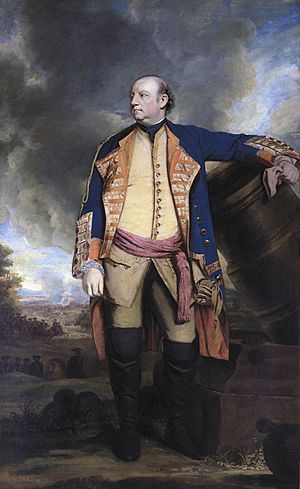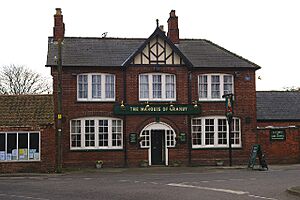John Manners, Marquess of Granby facts for kids
Quick facts for kids
Marquess of Granby
|
|
|---|---|
 |
|
| Born | 2 January 1721 Kelham, Nottinghamshire
|
| Died | 18 October 1770 (aged 49) |
| Alma mater | Eton College University of Cambridge |
| Spouse(s) | Lady Frances Seymour (m. 1750) |
| Children | 8 |
| Military career | |
| Allegiance | |
| Service/ |
|
| Rank | Lieutenant-General |
| Battles/wars | |
John Manners, Marquess of Granby (born 2 January 1721 – died 18 October 1770) was a famous British Army officer and politician. He was the oldest son of the 3rd Duke of Rutland. Since he passed away before his father, he was known by his father's other title, Marquess of Granby.
He fought in two important wars: the Jacobite rising of 1745 and the Seven Years' War. Because of his bravery and skill, he later became the Commander-in-Chief of the Forces, which was a very important job in the army. Soldiers really liked him. Even today, many British pubs are named after him!
Contents
Early Life and Education
John Manners was born in Kelham, Nottinghamshire, on 2 January 1721. His father was John Manners, the 3rd Duke of Rutland. His mother was Lady Bridget Manners.
He went to Eton College and finished there in 1732. After that, he studied at Trinity College, Cambridge, graduating in 1738. In 1740, John went on a "Grand Tour" of Europe. This was a common trip for young noblemen to learn about other cultures. He visited Italy and the Ottoman Empire before returning home in 1742.
Starting in Politics
In 1741, John Manners was chosen to be a member of parliament for Grantham. This town had a small number of voters. Powerful families, like his own, often helped choose who would represent Grantham in Parliament.
Military Adventures
Fighting in the Jacobite Rising
In 1745, a rebellion called the Jacobite rising of 1745 broke out in Britain. John Manners helped his father create a volunteer army in Rutland to help stop the rebellion. His regiment was meant to guard Newcastle upon Tyne. It was the only volunteer group that managed to get all 780 soldiers it needed.
John became a colonel of this regiment. Even though his regiment stayed in Newcastle, he went to the front lines. He joined the Duke of Cumberland's team and fought in the last parts of the rebellion. He was at the Battle of Culloden. When his regiment wasn't paid, John paid the soldiers himself. After this, he went to Flanders to work as an intelligence officer.
Rising Through the Ranks
In 1752, the government wanted John Manners to become the colonel of a famous army group, the Royal Horse Guards. This would help them get his family's support in Parliament. The king, George II, didn't agree at first.
John continued his political work and was elected for Cambridgeshire in 1754. The king started to like him more because he supported the government in Parliament. John was promoted to major-general on 18 March 1755. Finally, on 27 May 1758, he became the Colonel of the Blues.
In 1759, he became the main commander of the British forces in Germany. He was known for being brave and a good soldier. He also cared a lot about his soldiers' well-being and morale. He believed that if soldiers were well-cared for and happy, they would fight better. Many paintings show him helping wounded soldiers.
The Seven Years' War
John Manners was sent to Paderborn to lead a cavalry group. During a charge at the Battle of Warburg, he supposedly lost his hat and wig. This led to a special tradition in the British Army. Soldiers of the Blues and Royals are the only ones who can salute without wearing their hats!
He was promoted to lieutenant general in 1759. Later that year, he fought at the Battle of Minden. His leadership of the cavalry was excellent. He showed courage, control, and good communication.
His victory at the Battle of Warburg in July 1760 was very impressive. His army was much smaller than the enemy's, but he won. This made him a true British military hero. Even the enemy commander, the duc de Broglie, was so impressed that he asked for a portrait of Granby to be painted. John also had successes at the Battle of Emsdorf in July 1760, the Battle of Villinghausen in July 1761, and the Battle of Wilhelmsthal in June 1762.
Important Political Roles
When John Manners returned to England, he was seen as a hero. A painting showed him helping a sick soldier, which made people like him even more. He tried to stay out of party politics but supported the Treaty of Paris. He was appointed Master-General of the Ordnance on 14 May 1763. This job was in charge of military supplies and weapons. He also became Lord Lieutenant of Derbyshire in 1764.
Commander-in-Chief
In 1766, John Manners was appointed Commander-in-Chief of the Forces. This was the top job in the army. He worked hard during the 1768 elections, helping his family's political influence grow.
Later, he faced some political challenges. He had to make tough choices about supporting the government. He was criticized by a political writer. This criticism, along with his changing political views, affected his popularity.
Leaving Office
Eventually, John Manners decided to leave his political jobs. He resigned as commander-in-chief and Master-General of the Ordnance on 9 January 1770. He kept only his role as colonel of the Blues.
After leaving office, he faced financial difficulties. He passed away shortly after.
Death and Legacy
John Manners, Marquess of Granby, died in Scarborough, North Yorkshire, on 18 October 1770. He was 49 years old. Many people were very sad about his death.
He is most famous today because so many pubs are named after him. It's said that he would help his old soldiers by setting them up as pub owners when they were too old to serve in the army anymore. This shows how much he cared for his troops.
Family Life
John Manners had two children before he married:
- George Manners (1747–1772)
- Anne Manners, who married her cousin, John Manners-Sutton
He married Lady Frances Seymour (1728–1761) on 3 September 1750. They had six children:
- John Manners, Lord Roos (1751–1760)
- Lady Frances Manners (1753–1792)
- Charles Manners, 4th Duke of Rutland (1754–1787)
- Lady Catherine Manners (died young)
- Lord Robert Manners (1758–1782)
- Lady Caroline Manners (died young)
 | William M. Jackson |
 | Juan E. Gilbert |
 | Neil deGrasse Tyson |


